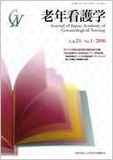Japanese
English
- 販売していません
- Abstract 文献概要
- 参考文献 Reference
抄録
マット型睡眠計を特別養護老人ホームに設置し,要介護高齢者の睡眠状態を1年間にわたって記録した.分析対象者は1年間継続してデータ収集ができた15人であった.平均年齢は85.4±8.6歳,性別は男性4人,女性11人であった.平均入所期間は4年0か月であった.要介護度は「1」が3人,「2」は8人,「3」は4人であった.
1年間を通した平均では,入眠時刻は19時19分,起床時刻は6時23分,睡眠時間は11時間5分であり,夕食後すぐに就寝する例が多くみられた.浅睡眠率は66%,深睡眠率は4%,レム睡眠率は17%であった.季節差について分析したところ,冬季は夏季と比較して,入眠時刻が早く起床時刻は遅く睡眠時間が長かった.ただし,冬季は中途覚醒時間が多くレム睡眠が少なかったことから,睡眠時間は長いものの睡眠の質は低いと考えられる.以上から,夕食後の過ごし方の工夫や冬季における太陽光の取り込みおよび寝床内気候を整えるケアの必要性が示唆された.
We investigated for one year the sleep-state of elderly people requiring long-term care in a special nursing home in the Hokuriku region of Japan, using mattress-type sleep monitors. A total of 15 participants were recruited and their data were recorded over one year and analyzed. The 15 participants comprised 4 males and 11 females, with a mean age of 85.4 ± 8.6 years. Their average length of stay in the nursing home was 4 years. In terms of level of required care, three participants required level-1 care, eight required level-2 care, and four required level-3 care.
Throughout the year of data collection, the average sleep-onset time was 7:19 p.m., demonstrating that participants were likely to go to bed immediately after dinner. The average wake-up time was 6:23 a.m., and the average sleeping duration was 11 h and 5 min. The proportions of light, deep, and REM sleep were 66%, 4%, and 17% of the sleeping hours, respectively. In terms of seasonal differences in sleep-state, sleep-onset time was earlier and waking time was later in winter, compared with those in summer, resulting in longer sleeping hours in winter. However, because a longer interrupted sleep and a shorter REM sleep were recorded in winter, the quality of sleep in winter was lower than that in summer, despite the longer sleeping hours. In conclusion, results suggest that the residents would benefit from staying awake longer after dinner, resting in sunlight, and having a warmer bedroom in winter.
Copyright © 2016, Japan Academy of Gerontological Nursing All rights reserved.


